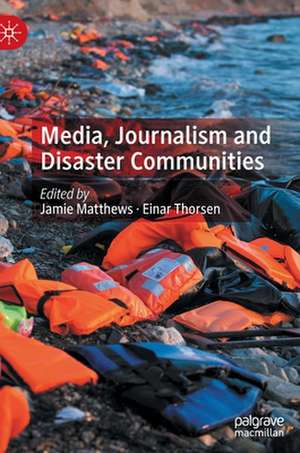Media, Journalism and Disaster Communities
Editat de Jamie Matthews, Einar Thorsenen Limba Engleză Hardback – 21 mar 2020
| Toate formatele și edițiile | Preț | Express |
|---|---|---|
| Paperback (1) | 626.08 lei 6-8 săpt. | |
| Springer International Publishing – 21 mar 2021 | 626.08 lei 6-8 săpt. | |
| Hardback (1) | 588.58 lei 38-44 zile | |
| Springer International Publishing – 21 mar 2020 | 588.58 lei 38-44 zile |
Preț: 588.58 lei
Preț vechi: 639.75 lei
-8% Nou
Puncte Express: 883
Preț estimativ în valută:
112.64€ • 117.35$ • 93.65£
112.64€ • 117.35$ • 93.65£
Carte tipărită la comandă
Livrare economică 04-10 februarie 25
Preluare comenzi: 021 569.72.76
Specificații
ISBN-13: 9783030337117
ISBN-10: 3030337111
Pagini: 247
Ilustrații: XV, 247 p. 9 illus.
Dimensiuni: 148 x 210 mm
Greutate: 0.47 kg
Ediția:1st ed. 2020
Editura: Springer International Publishing
Colecția Palgrave Macmillan
Locul publicării:Cham, Switzerland
ISBN-10: 3030337111
Pagini: 247
Ilustrații: XV, 247 p. 9 illus.
Dimensiuni: 148 x 210 mm
Greutate: 0.47 kg
Ediția:1st ed. 2020
Editura: Springer International Publishing
Colecția Palgrave Macmillan
Locul publicării:Cham, Switzerland
Cuprins
1. Introduction.- 2. Brazilian Local and National News Coverage of the Samarco Disaster: A Disaster for the Community, the Corporation or the Environment?.- 3. Reporting from the ‘inner circle’: afno manche and commitment to community in post-earthquake Nepal.- 4.Kesennuma’s Building for the Future and Ishinomaki’s Rolling Press: sharing localised news of recovery from Tōhoku’s disaster-affected communities.- 5. Drought is a disaster in the city: Local news media’s role in communicating disasters in Australia.- 6. Media and climate migration:
Transnational and local reporting on vulnerable island communities.- 7. Changing the story of urban violence in El Salvador. The crónica, the community and voices from the ganglands.- 8. Oscillating between alienation and frustrated engagement: the study of Donbas residents’ response to conflicting narratives in the media.- 9. ‘Bloodbath, invasion, massacre’: Idoma Voice and the framing of the farmer-herder conflict in Benue State, Nigeria.- 10. Media and reconciliation: a study of media-led initiatives in post-IS Mosul.- 11. Is local journalism failing? – local voices in the aftermath of the Grenfell and Lakanal fire disasters.- 12. Attributes in Community and National News Coverage of the Parkland Mass Shootings.- 13. Informing refugee communities in Greece: What is possible within the parameters of the humanitarian structure?.- 14. When Media Fuel the Crisis: Fighting Hate Speech and Communal Violence in Myanmar.
Notă biografică
Jamie Matthews is Senior Lecturer in Communication and Media at Bournemouth University, UK.
Einar Thorsen is Professor of Journalism and Communication, and Deputy Dean of Research and Professional Practice in the Faculty of Media and Communication at Bournemouth University, UK.
Einar Thorsen is Professor of Journalism and Communication, and Deputy Dean of Research and Professional Practice in the Faculty of Media and Communication at Bournemouth University, UK.
Textul de pe ultima copertă
This book illuminates the concept of disaster communities through a series of international case studies. It offers an eclectic overview of how different forms of media and journalism contribute to our understanding of the lived experiences of communities at risk from, affected by, and recovering from disaster. This collection considers the different forms of media and journalism produced by and for communities and how they may recognise and speak to the different notions of community that emerge in disaster contexts – including vulnerabilities and consequences that arise from environmental destruction and geophysical hazards, the insecurity created by armed conflict and limitations on journalistic freedoms, and result from human (in)action and humanitarian crises.
Caracteristici
Develops the concept of disaster communities through a series of international case studies Evaluates the role of local media and journalism in supporting communities that are at risk from, affected by, and recovering from disaster Argues that disasters reflect the accumulation and intersection of hazards, risks, and vulnerabilities that lead to adverse effects for communities
